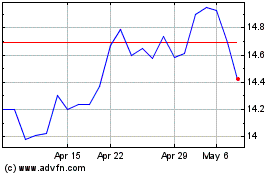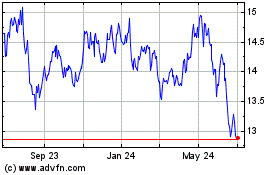Country's beer makers keep a grip on their home market, while
branching out abroad
By Atsuko Fukase and Megumi Fujikawa
TOKYO -- In an era when Budweiser is sold by a Belgium-based
company and California's Lagunitas IPA is partly Dutch-owned,
Japanese beer has remained in Japan's hands, away from the global
consolidation party.
The head of the biggest-selling Japanese beer maker says he
wants to keep it that way.
"The subtle taste and quality of beer that the Japanese favor
can be created only under Japanese management," said Akiyoshi Koji,
president of Asahi Group Holdings Ltd., in an interview. "If a
foreign company takes control of a Japanese maker, there is a risk
of the brand's credibility being harmed."
The planned merger of the world's two biggest beer makers,
Anheuser-Busch InBev NV and SABMiller, has brought renewed
attention to global consolidation. Japan is something of an anomaly
because its top players have been the same for decades. Tokyo-based
Asahi and its leading rival in Japan, Kirin Holdings Co., are
minnows globally but big fish in their own pond.
That pond is getting smaller. Japan's population is shrinking
and younger consumers are heading toward wine or cocktails instead
of beer. Shipments of beer and related brews including low-malt
beer came to about 425 million cases in 2015, compared with a peak
of 573 million cases in 1994, according to the Brewers Association
of Japan.
The answer, say Asahi and its main Japanese rivals, is to branch
out into other drinks and try to build a global business focused on
premium brands.
However difficult it may be for foreigners to re-create the
taste of Japanese beer, Mr. Koji is betting billions of dollars
that his company can do so with Italian and Dutch beer. Asahi plans
to acquire European brands Peroni and Grolsch for $2.9 billion from
SABMiller, divestitures that SABMiller is making to get regulatory
clearance for the Anheuser-Busch InBev deal.
"We aren't planning to engage in a head-on fight with products
in a similar price range" to those from AB InBev, Mr. Koji said.
"We would like to challenge our global competitors with value-added
products."
Mr. Koji said Asahi had room to make further acquisitions,
although he declined to say whether he was interested in Eastern
European assets of SABMiller that are also up for sale. An Asahi
spokesman said the company could spend roughly $3 billion to $4
billion for further acquisitions and still stay within its debt
target.
The Anheuser-Busch InBev-SABMiller combination would create a
giant brewer with around 30% global market share by volume. That
compares with 1.2% for Asahi, putting it in 10th place, according
to Euromonitor.
The megamerger could pose "immense competition to the Japanese
beer companies," said Ranjan Kumar Singh, an analyst at Allied
Market Research. "The big players are using these strategic moves
to boost profitability by cutting costs."
Asahi is still growing, despite slower sales of its flagship
Super Dry brand. The company has recently posted steadily rising
revenue and profit, with sales of Yen1.86 trillion ($18.2 billion)
in 2015. Its market capitalization of Yen1.6 trillion slightly
exceeds Kirin's.
It has kept growing partly by diversifying into products such as
wine and baby food, and by adding beer alternatives that cost less
because of lower taxes. These include "new genre" products brewed
from peas or corn to avoid Japan's taxes on malt.
Such peculiarities in taxes and distribution have turned the
nation's beer market into another example of what locals call the
Galapagos phenomenon, in which Japan evolves in isolation from
global trends. That is another reason Mr. Koji is confident
foreigners wouldn't try to buy Asahi.
"I wouldn't say there's no risk of being acquired," he said.
"But for foreign brewers, it would be extremely difficult to buy a
Japanese maker and further boost profitability."
AB InBev set up an office in Tokyo about a year ago to work more
effectively with local partners that handle its beer brands in
Japan, regional director Toon Van der Veer said in an email. He
declined to comment on whether AB InBev would be interested in
directly challenging Japanese beer makers in their home market.
Japan's other top beer makers, which include Suntory Holdings
Ltd. and Sapporo Holdings Ltd., have tried similar strategies of
holding on to their core beer market at home while branching out
abroad.
"AB InBev's acquisition of SABMiller could change power
relationships of the beer industry. However, it won't directly
affect Suntory because we mainly focus on premium beer, as well as
soft drinks, health food and other alcohol," Suntory Holdings
president Takeshi Niinami said in an email.
Suntory, which has long had a more diversified portfolio than
Asahi or Kirin, further broadened its business through the $16
billion acquisition of U.S. whiskey maker Beam in 2014.
Kirin, which bought a 55% stake in Myanmar Brewery for $560
million last year, says it is focusing on cost cuts to counteract a
shrinking home market. Part of its strategy has echoes of the
global consolidation trend, but it is consolidation with a Japanese
flavor: combining certain operations rather than entire companies.
Kirin and Asahi recently said they would open a joint logistics
center and share trains to ship their beer beginning next year.
(END) Dow Jones Newswires
September 01, 2016 02:50 ET (06:50 GMT)
Copyright (c) 2016 Dow Jones & Company, Inc.
Kirin (PK) (USOTC:KNBWY)
Historical Stock Chart
From Dec 2024 to Jan 2025

Kirin (PK) (USOTC:KNBWY)
Historical Stock Chart
From Jan 2024 to Jan 2025
